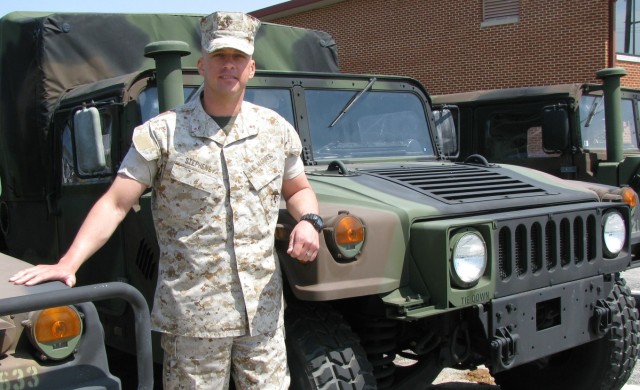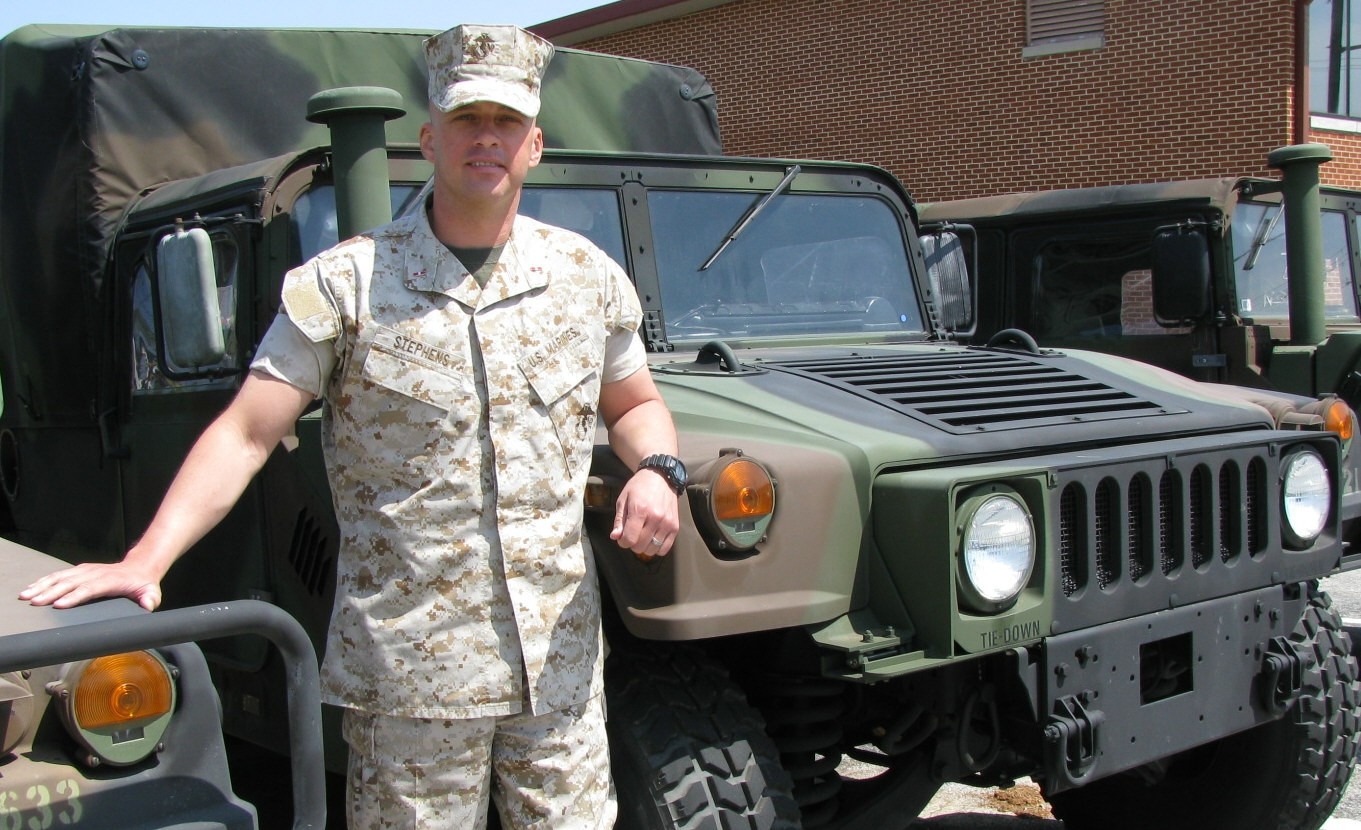Two days before the birth of his daughter, Marine Corps Chief Warrant Officer 3 R. Dale Stephens learned he was being deployed for the second time to Iraq.
Mallory Paige was 3 months old when her daddy shipped out to Camp Lejeune, N.C., for training prior to his mid-September deployment with the P Battery, 5th Battalion, 14th Marines out of Spokane, Wash., and attached to the 1st Battalion, 10th Marines, Task Force Military Police.
She was 13 months old when Stephens returned home April 25 with a bright-colored Marine Corps teddy bear as a gift for his daughter.
The separation from his young first-born child and his wife of just five years, Lauriellen, was tough by any standards. But a Marine does what he's told to do, goes where he's told to go and stands for values that endure long after the memories of separation have dimmed.
"Marines do what they're told," Stephens said. "I could have retired instead of go to Iraq. But I chose to go instead because I am a Marine. This has been my life's choice. I had 20 years worth of training and preparedness for what I was doing over there."
Stephens, 38, has served 21 years in the Marines, with 10 of those years on active duty. He has served in Kuwait during Desert Storm in 1990-91, in Iraq in 2004-05 during Operation Phantom Fury and in 2007 during Operation Iraqi Freedom, in Somalia in 1992 and in New Orleans in 2003. When he's not on active duty, Stephens works as a supervisor for the U.S. Postal Service at its Wall Triana facility.
During his recent eight-month tour in Iraq, Stephens was a platoon commander for a convoy security team consisting of three platoons based at Camp Ramadi in the Al Anbar province. There were 47 Marines and three Navy Corpsmen in his platoon.
"We traveled all over Iraq," Stephens said. "We escorted logistical supplies for the Multi-National forces in western Iraq. We also escorted detainees from tactical units to Camp Cropper in Baghdad. Most days, we were threatened by IEDs (improvised explosive devices) and ambushes."
The experience on this deployment was vastly different than his first tour in Iraq with the 1st Marine Regiment in 2004-05 during Operation Phantom Fury. During that deployment, Stephens was a fire support coordinator on a Marine mission to take the city of Fallujah.
"There were lots of fire fights," Stephens said. "I coordinated close air support and indirect fire for the 1st Marine Regiment."
While highly dangerous, that first deployment involved an exact mission and a clearly defined goal of taking a city from the terrorists. Stephens' second deployment was more peaceful and, at the same time, more menacing.
"The people are changed. They are out walking the streets, shopping, getting on with their lives. Things are definitely getting better for the Iraqi people," Stephens said.
"But that created a new level of danger. Providing protection on missions was more complex because the Iraqi people are physically a lot closer to us now. There are different rules of engagement. As a Marine, we wanted them to feel comfortable around us. But we still wanted to have the space we needed to feel comfortable. It can be a very dangerous situation."
Stephens' platoon worked with Iraqis daily, providing security for Iraqi government officials and tribal leaders in Ramadi. Such missions are extremely dangerous because they require transporting officials through places like Al Qa'im, Tarbil, Baghdad and Fallujah.
"My platoon of 15 vehicles did 120,000 road miles while we were there," Stephens said. "Normally, our missions required us to travel during the day, and that was pretty safe, especially since we were traveling in armored vehicles equipped with 12 heavy machine guns. The Iraqis and the terrorists don't have the capability to fight against that kind of power. That's why IEDs are the biggest threat."
The convoy security team also worked on several joint raids with Soldiers in parts of Iraq that were "hot spots." At times, Iraqi military and police would also participate in raids.
"It's a slow process of training Iraqi military and police," Stephens said. "They were under Soviet doctrine for so long. It is taking time to teach them what it means to provide leadership and to be responsible for small units of military and police."
The mission left this new dad a bit more worried than usual for both himself and his Marines.
"Those worries may have been because of the new baby, or they could have been because I knew the most dangerous place in Iraq is on the road and that's where we spent most of our time," Stephens said. "Or, it could have been some of both."
Stephens, an Ardmore High School graduate, joined the Marines when he was 17. Nearly seven years later, he joined the Marine Reserves, Kilo Battery, in Huntsville so that he could pursue a degree at Calhoun Community College and Athens State University, and begin a civilian career.
"Ever since I was 5 years old I wanted to be a Marine. I always considered the Marines as being the best," he said. "I joined the active Reserves because I wanted the time to go to college, but I didn't want to leave the Marines."
Stephens is grateful for the training and experience of being a Marine, something that has influenced all aspects of his life.
"Marines stand up for something, regardless of what is happening around them. Our values - honor, courage, country -- won't bend for society," he said. "We live with those values and we take them with us as a Marine and into our civilian lives.
"When you are a platoon leader you have to have especially tough standards for yourself and your young Marines. We lead by example. It's not an easy challenge when your Marines are 20 years younger than you."
While in Iraq, Stephens spent a lot of time mentoring his Marines, most of which were from the Spokane area.
"I counseled them on every aspect of their lives. I lead them," he said.
"When I joined up with my platoon, I had 50 Marines whose faces I didn't even know. But Marines are the same everywhere. It wasn't long before I knew them all. Now, they want me to attend their Marine Corps Ball in November."
He said the war in Iraq has changed the Marine Reserves in a positive way.
"It's made us focus on our mission more. We have a war going on, so we don't have as much time at garrison," he said. "It has made us more of a professional warrior. Marine Reserves who don't have the stomach for it have left us long ago.
"But we haven't had a lot of trouble recruiting because the values that are core to a Marine have not changed. Being a Marine is not something you think about. It's something you do ... And, as a Marine, you know the man on your left and the man on your right has made the same commitment to our values, and they will do the right thing regardless of what the cost is - and we know what that cost is. I'm happy to do my service. I'm happy to do all I can for my nation."
During his deployment, Stephens talked to his wife nearly every day. They also communicated frequently via e-mail.
But that was no substitute for being able to see his daughter grow from an infant to a toddler. Stephens is looking forward to a 40- to 50-day leave to make up for lost time.
"She still looks at me kind of funny when I greet her in the morning," he said with a smile. "But that will change."


Social Sharing